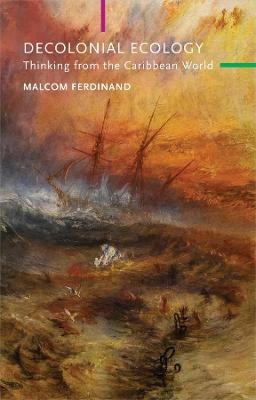
Decolonial Ecology
Polity Press (Verlag)
978-1-5095-4623-7 (ISBN)
In this important new book, Malcom Ferdinand challenges this double fracture, thinking from the Caribbean world. Here, the slave ship reveals the inequalities that continue during the storm: some are shackled inside the hold and even thrown overboard at the first gusts of wind. Drawing on empirical and theoretical work in the Caribbean, Ferdinand conceptualizes a decolonial ecology that holds protecting the environment together with the political struggles against (post)colonial domination, structural racism, and misogynistic practices.
Facing the storm, this book is an invitation to build a world-ship where humans and non-humans can live together on a bridge of justice and shape a common world. It will be of great interest to students and scholars in environmental humanities and Latin American and Caribbean studies, as well as anyone interested in ecology, slavery, and (de)colonization.
Malcom Ferdinand is a researcher in political ecology and environmental humanities at the CNRS and Université Paris Dauphine-PSL.
List of Illustrations
Index of Ships
Acknowledgements
Foreword – Angela Davis
Prologue
Part 1: The Modern Tempest: Environmental Violence and Colonial Ruptures
Chapter 1: Colonial Inhabitation: An Earth without a World
Chapter 2: The Matricides of the Plantationocene
Chapter 3: The Hold and the Negrocene
Chapter 4: The Colonial Hurricane
Part 2: Noah’s Ark: When Environmentalism Refuses the World
Chapter 5: Noah’s Ark: Boarding, or the abandonment of the world
Chapter 6: Reforesting without the World (Haiti)
Chapter 7: Paradise or Hell in the Nature Preserves (Puerto Rico)
Chapter 8: The Masters’ Chemistry (Martinique and Guadeloupe)
Chapter 9: A Colonial Ecology: At the Heart of the Double Fracture
Part 3: The Slave Ship: Rising Up from Modernity’s Hold in Search of a World
Chapter 10: The Slave Ship: Debarking Off-World
Chapter 11: Maroon Ecology: Fleeing the Plantationocene
Chapter 12: Rousseau, Thoreau, and Civil Marronage
Chapter 13: A Decolonial Ecology: Rising up from the hold
Part 4: A World-Ship: World-Making Beyond the Double Fracture
Chapter 14: A World-Ship: Politics of encounter
Chapter 15: Forming a Body in the World: Reconnecting with a Mother-Earth
Chapter 16: Interspecies Alliances: The Animal Cause and The Negro Cause
Chapter 17: A Worldly-Ecology: On the Bridge of Justice
Epilogue
World-Making
The Intrusion of Ayiti
Recovering the Sun of Africa
Notes
| Erscheinungsdatum | 29.11.2021 |
|---|---|
| Reihe/Serie | Critical South |
| Übersetzer | Anthony Paul Smith |
| Vorwort | Angela Davis |
| Verlagsort | Oxford |
| Sprache | englisch |
| Maße | 137 x 213 mm |
| Gewicht | 386 g |
| Themenwelt | Naturwissenschaften ► Biologie ► Ökologie / Naturschutz |
| Sozialwissenschaften ► Soziologie | |
| ISBN-10 | 1-5095-4623-5 / 1509546235 |
| ISBN-13 | 978-1-5095-4623-7 / 9781509546237 |
| Zustand | Neuware |
| Informationen gemäß Produktsicherheitsverordnung (GPSR) | |
| Haben Sie eine Frage zum Produkt? |
aus dem Bereich


